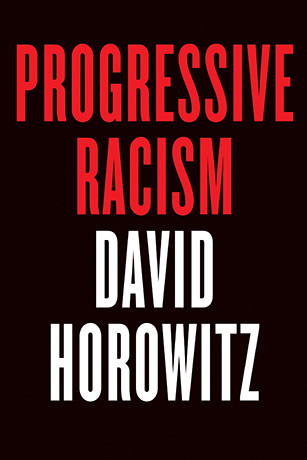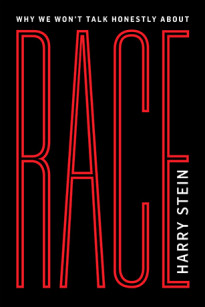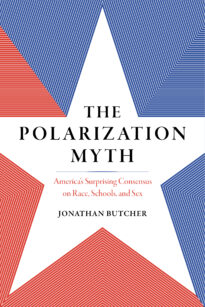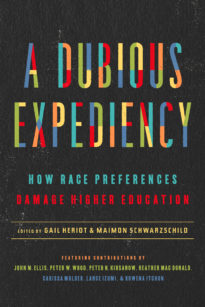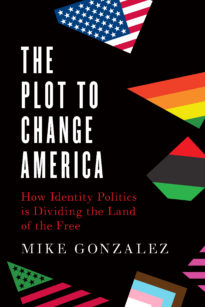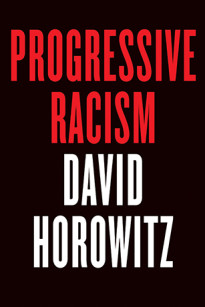America’s political culture has been tragically warped by progressives through their rejection of the color blind standard established by the Constitution and once championed by the civil rights movement and its leader Martin Luther King.
Progressives have been able to persuade an influential section of the country to believe that whites are guilty before the fact and blacks are innocent even when the facts show they are guilty. The racial morality play of “white supremacy” and black “oppression” provides an indispensable myth for advancing their political agendas, which is why it has proved so durable.
The fact that racial injustice is the most problematic aspect of the nation’s heritage is also the reason that it is the focus of the progressive assault on America and its social contract. For obvious reasons, progressives largely concentrate on one race—American blacks, or “African-Americans” as they have come to be known through at least five permutations of linguistic political correctness since World War II: “coloreds,” “Negroes,” “blacks,” “persons of color” and—only then— “African-Americans.” The injustices of slavery and segregation and the historic sufferings of this community form an arguable basis for the progressive indictment, but only by systematically ignoring the historic gains—unprecedented and unparalleled—of this same community, which are the direct result of America’s tolerant and individual-centered social contract.
The introduction to this volume, “The Reds and the Blacks,” explains how the left’s melodrama of “oppression” and “social justice” is an extension of Marx’s discredited formulas of class oppression, which if successful will lead to the same results. Parts I and II that follow address the falling-away of the civil rights movement from the values championed by Martin Luther King, precisely because they are the values enshrined in the American founding and diametrically opposed to the socialist values of progressives.
“Memories in Memphis,” is an account of my visit to the National Civil Rights Museum housed in the motel where King was murdered. Inexplicably, the Civil Rights museum honors not only Dr. King but the anti-Semitic and anti-American racist Elijah Muhammad along with Malcolm X who derided King and the civil rights movement, claiming that racist America would never let them succeed. The museum provided a summary statement of the transformation of the civil rights movement after King’s death.
Until that moment the civil rights movement was a mass effort to integrate African-Americans into America’s multi-ethnic democracy. Less than a decade later it had become a movement to refashion racial grievances into a general assault on white people, on America and on the idea of a society in which people were judged by the content of their character and not the color of their skin. It was now color-coded instead of color-blind. The post-King civil rights movement was a creation of the political left and an assault on the most basic tenet of America’s social contract, enshrined in the 14th Amendment: the commitment to equal rights for all individuals, and thus to race-neutral standards and governmental practices. This commitment was anathema to progressives who were collectivists. They changed the course of the civil rights cause into a movement to transform the very meaning of the 14th Amendment and turn it into its opposite by institutionalizing racial preferences—the same kind of discriminatory practices that had characterized the era of segregation just passed. Destroying King’s legacy, progressives set out to recreate a race-conscious political culture in which blacks and a handful of designated minorities were singled out as groups to be racially privileged above all others, and particularly above whites who were made targets of exclusion, suspicion and disapprobation regardless of their actions or beliefs.
The third part of this volume recounts an effort I conducted in the spring of 2001 to oppose a campaign by the left to secure reparations for slavery 137 years after the fact. Reparations for slavery became a favored project of progressives because it made sure that the heritage of America’s “peculiar institution” remained alive and well a century and more after its abolition. In fact, reparations were a cause that had been first proposed in 1969, during the civil rights era – and was rejected by every major civil rights organization. At the time of the proposal there were no slaves alive to receive reparations, while the vast majority of Americans who would be forced to pay them were descended from immigrants who had arrived in America well after slavery was abolished. The clear goal of the radicals who launched the campaign was to indict America as a racist society, and sow the seeds of racial division and conflict. It also provided an ideological justification for a shakedown effort of the kind that had come to characterize the civil rights leadership of Jesse Jackson and Al Sharpton. Pay us or we’ll denounce you as racists.
Democratic congressman John Conyers was the author of the legislative bill supported by the reparations movement. During the controversy, a Republican majority in the House of Representatives prevented Conyers’s legislation from being passed out of the Judiciary Committee and sent to the House floor, a fact that the left seized on to insinuate that Republicans were racists. Yet when Democrats won control of the House in 2006 and Conyers became chair of the Judiciary Committee under a newly elected African-American president, the bill was not passed and the reparations issue, which had been infused with such ersatz moral urgency until then, faded quickly from view. Few episodes seem better designed to illustrate how race had become a political weapon for a movement driven more by its anti-American and anti-white animus than a desire to correct actual injustices.
Yet this animus is so integral to the progressive mind-set that they refuse to let the reparations idea die. In June 2014, the prestigious Atlantic Monthly published a lengthy and widely praised, “Case for Reparations” by Ta-Nehisi Coates. Coates’ argument shared the features characteristic of all reparations proponents – anti-white racism and anti-American fervor, along with a consistent failure to confront the complexity of the facts. Slavery existed in black Africa for a thousand years before a white European ever set foot on the continent. The African slaves who were shipped to the western hemisphere were enslaved in the first place by black Africans and then sold to European traders. At the time of the Atlantic slave trade, slavery had existed in all societies and among all ethnicities for 3,000 years and was never regarded as immoral until white Christians declared it so in the late 18th Century, and then launched the anti-slavery movement.
In 1787 a new nation was established on the American continent formally dedicating itself to the proposition that all men were created equal. In a little over a generation, Americans abolished slavery – an institution that still exists in Africa today. There were not 250 years of American slavery as Coates and others falsely maintain but 76 – from the adoption of the Constitution in 1787 until the Emancipation Proclamation in 1863. To enforce that Proclamation and end slavery three hundred and fifty thousand mostly (but not exclusively) white Americans sacrificed their lives in a war bloodier than all America’s wars since.
Why should the government that led the world in liberating slaves be punished more than a hundred years later, and when all slaves and slave owners are dead? Coates attempts to answer the question by devoting the bulk of his essay to the plight of inner city black communities. In his presentation, segregation and discriminatory housing laws – legacies of slavery’s racist attitudes – form the moral grounds for a current reparations claim. But in making this claim Coates ignores the remarkable rise of the black middle class, virtually non-existent in 1940, but which now encompasses half of all African Americans. This fact alone nullifies his argument that slavery and segregation – both now long past — are chiefly responsible for black poverty. Like other reparations advocates, Coates contemptuously dismisses the notion that the decline of the black family and pathologies associated with welfare dependency and absent fathers might lie at the root of the problem. Like them he also fails to acknowledge the trillions of welfare dollars that have been devoted to ameliorating black poverty and failed, or to explain why reparations trillions would lead to a different result.
Finally this volume examines the way progressive attacks on a chimerical “white supremacy” have been destructive for all citizens. The principal target of this racism, as already noted, is the idea of equal treatment for all individuals under the law, an idea that progressives seek to replace with group identities and group privileges based on race and gender. The idea of an equality of individuals without regard to race, ethnicity or gender, on the other hand, is the very idea that informs the American identity, and unites its diverse communities into a single nation.
There will always be racists and bigots. Only utopians will fail to understand this and seek to deploy the coercive powers of the state to make everyone engage in the gestural politics of politically correct right-thinking. By contrast, people connected to the realities of this world recognize that America is the most tolerant of societies. Americans’ cultural acceptance of racial, ethnic and gender minorities is virtually without parallel in human history. Interracial marriage, once the strongest racist taboo, is now hardly noticed, whether among ordinary Americans or cultural celebrities; large American cities – Detroit, Philadelphia and Atlanta – are run by African American administrations and an African American has been twice elected to the White House. In their battles with “white supremacy,” progressives cling to a past that is already remote. They have become the true reactionaries of our time, and it is hardly surprising that they are its new racists as well.
